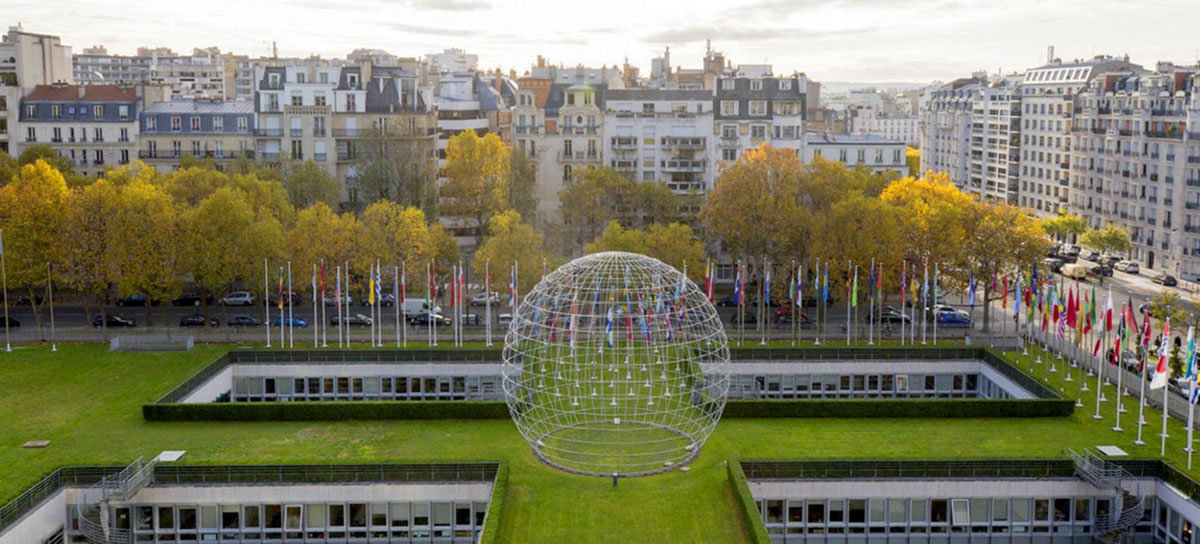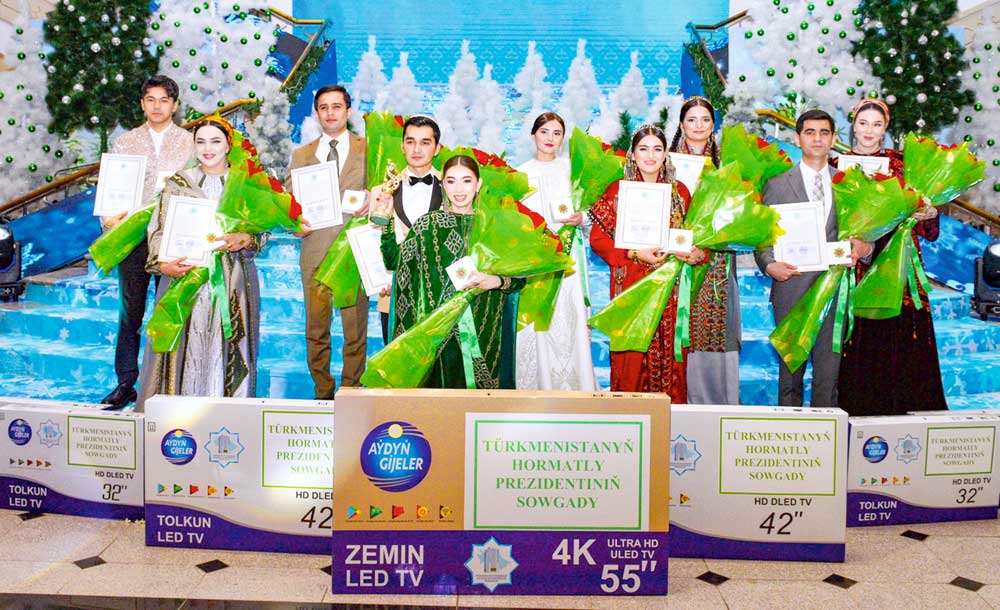For 75 years now, UNESCO has been protecting and enhancing the cultural heritage of mankind, protecting natural resources and promoting the development of education and science. The role of this organization in the modern world can hardly be overestimated. The participants and guests of the festive ceremony spoke about this.
The UN News Center reports: “The event, held at the headquarters in Paris, was attended by more than 20 heads of state and government, scientists and artists. The UN Secretary General sent his video message”.
In it, Antonio Guterres recalled that the Organization for Education, Science and Culture, created after one of the darkest periods in the history of mankind, focuses its activities on the development of human potential, on the preservation and enhancement of cultural values, as well as on the protection of the world around us and advancing science about it.
The UN head stressed: “World Heritage Sites, Biosphere Reserves, the CERN Research Center ... it all came about thanks to UNESCO. At a time of enormous inequality, environmental crises, polarization in societies and a global pandemic, the role of UNESCO is more important than ever ”.
Fulfilling its tasks, the organization is looking for ways to build trust between peoples, attracting partners around the world to restore and protect objects of both natural and cultural heritage. UNESCO conferences are held annually, at which, at the suggestion of the Member States, natural reserves, architectural objects, traditions and rituals of the peoples of the world are added to the List of World Cultural Heritage.
The most important element, according to the UN Secretary General, is the educational and scientific activities of UNESCO. Thanks to the support of the organization, millions of children around the world receive high-quality modern education, and scientists have the chance to conduct research in collaboration with colleagues around the world.
One recent example of this interaction is the report on the future of schools. Experts invited by UNESCO have developed a document on the basis of which it is proposed to reform school education around the world. As conceived by the authors, schools, wherever they are, should become centers of public life, uniting all spheres of human activity and providing access to information using modern technologies, including via the Internet.
UNESCO promotes the role of women and girls in science, sets norms in bioethics and artificial intelligence and performs a number of other tasks. It is important, according to the Secretary-General, that UNESCO is “developing new means to combat disinformation and incitement to hatred”.
In congratulating UNESCO on its anniversary, António Guterres concluded that all of the above highlight the important role of the organization as “a central unifying element of an inclusive and effective multilateral approach that brings tangible benefits to people around the world”.
The celebration of the 75th anniversary has become one of the main events in the framework of the session of the General Conference of UNESCO, which takes place from 9 to 24 November. Early this week, delegates to the Conference approved the re-election of Audrey Azoulay to a new term as Director-General of UNESCO. 155 Member States voted in favor of Azoulay.
It should be recalled that Turkmenistan became a full member of UNESCO on August 17, 1993 by ratifying the corresponding document in London. In 1994, Turkmenistan joined the UNESCO Convention on the Protection of the World Cultural and Natural Heritage. To date, more than 1000 historical and cultural monuments have been identified and registered on the territory of Turkmenistan.
In 1995, a representative office of Turkmenistan to UNESCO was opened in Paris. The cluster (regional) office located in Tehran is responsible for the coordination of UNESCO's activities with Turkmenistan.
The National Commission of Turkmenistan for UNESCO is operating in Turkmenistan. In order to develop cooperation between Turkmenistan and UNESCO and improve the work of this Commission, President of Turkmenistan Gurbanguly Berdimuhamedov signed a Resolution on October 23, 2020, approving the composition of the National Commission of Turkmenistan for UNESCO and the Regulations on it.
President of Turkmenistan Gurbanguly Berdimuhamedov attaches great importance to the preservation of the national cultural heritage of the Turkmen people. It was he who proposed to initiate the process of nomination for inclusion in the UNESCO List of many objects and phenomena of the material and spiritual culture of the Turkmen people.
Within the framework of the UNESCO Convention "On the Protection of the World Cultural and Natural Heritage", more than 1000 historical and cultural monuments have been identified and registered in the territory of Turkmenistan.
Within the framework of this Convention, the UNESCO World Heritage List includes:
1. State cultural and historical reserve "Ancient Merv" as a monument of world significance for the first time from Turkmenistan in 1999.
2. State cultural and historical reserve "Kunya-Urgench" in 2005.
3. State cultural and historical monument "Parthian fortresses of Nisa" in 2007.
In 2011, Turkmenistan joined the UNESCO Convention for the Safeguarding of the Intangible Cultural Heritage and since then has been one of its most active parties. The UNESCO Representative List of the Intangible Cultural Heritage of Humanity includes: the epic "Gerogly" (2015), the Turkmen national art of singing and dancing "Kushtdepdi" (2017), as well as the traditional carpet weaving of Turkmenistan (2019).
The multinational nomination "Novruz Bairam" was considered during the 11th session of the Intergovernmental Committee for the Safeguarding of the Intangible Cultural Heritage on November 30, 2016 in Addis Ababa (Ethiopia) and included in the UNESCO Representative List of the Intangible Cultural Heritage of Humanity.
Turkmenistan continues active interaction with UNESCO, in particular, to enrich the World Heritage List.
Work in this direction, according to the instructions of the President of Turkmenistan Gurbanguly Berdimuhamedov, continues: next in line is the nomination of monuments located along the main routes of the Great Silk Road between such large ancient Turkmen cities as Dekhistan, Nisa, Merv, Serakhs, Amul, Kunyaurgench.
Work is also actively continuing to expand the UNESCO Representative List of the Intangible Cultural Heritage of Humanity.
The nomination of Turkmenistan "Craftsmanship of dutar making and traditional musical performing arts combined with singing" in the Representative List of the Intangible Cultural Heritage of UNESCO is scheduled for the end of 2021, when a meeting of the Intergovernmental Committee for the Safeguarding of the Intangible Cultural Heritage will be held at the UNESCO headquarters.
Also, the activity on the nomination of the national methodology and tradition of Akhal-Teke horse breeding and the breeding of Turkmen Alabai to the List of the Intangible Cultural Heritage of Humanity is aimed at revealing the contribution of the Turkmen people to the formation of civilization and world culture.
UNESCO is a specialized agency of the United Nations Educational, Scientific and Cultural Organization. Among the main goals of UNESCO is the promotion of peace and security by expanding cooperation between countries and peoples in the field of education, science and culture. UNESCO plays a primary role in international activities for the preservation of cultural monuments and natural landscapes, works to create conditions for an open dialogue based on respect for the universal values and dignity of each people. UNESCO headquarters is located in Paris, French Republic.








